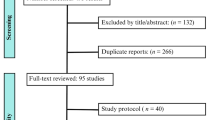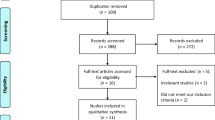Abstract
Purpose of Review
Obstetrical complications including indicated preterm birth (PTB), hypertension (HTN), IUGR, and GDM are risk factors for future cardiovascular disease. To identify patients at risk, the American Heart Association recommends obtaining a detailed obstetric history. Our objective was to determine if non-OB-GYN physicians-in-training obtain an obstetric history when assessing a risk profile for cardiovascular disease and to identify differences based on level of training. In 2019, an anonymous survey was distributed to trainees in internal medicine, cardiology, endocrinology, nephrology, and neurology. Subjects were queried about frequency of asking a history of PTB, IUGR, GDM, and HTN in pregnancy. Survey options were always/frequently/sometimes/rarely/never and were categorized into two groups: “ask” (always/frequently/sometimes) vs. “do not ask” (rarely/never). Comparisons between specialties and levels of training were made using chi-square and Fisher’s exact test. Comparisons within subjects were made using McNemar’s test.
Recent Findings
The response rate was 64% (210 total possible participants), including 98 internal medicine residents and 37 fellows in cardiology (21), endocrinology (3), nephrology (8), and neurology (5). Asking about medical complications (HTN + GDM) was significantly more common than asking about OB complications (PTB + IUGR) (p < 0.001). Internal medicine residents were less likely than subspecialty fellows to ask about HTN (31% vs. 70%; p < 0.001). There were no differences in likelihood of eliciting OB history based on PGY level.
Summary
An OB history can identify risk factors for cardiovascular morbidity. Our data demonstrates that physicians caring for women lack awareness on the association between complications in pregnancy and cardiovascular health.


Similar content being viewed by others
Abbreviations
- AHA:
-
American Heart Association
- GDM:
-
Gestational diabetes mellitus
- HTN:
-
Hypertension
- IUGR:
-
Intrauterine growth restriction
- OB:
-
Obstetric
- OB-GYN:
-
Obstetrics and gynecology
- PTB:
-
Preterm birth
References
Papers of particular interest, published recently, have been highlighted as: • Of importance •• Of major importance
ACOG. Practice Bulletin No. 203: chronic hypertension in pregnancy. Obstet Gynecol. 2019;133(1):e26–50. https://doi.org/10.1097/AOG.0000000000003020.
Auger N, Fraser WD, Schnitzer M, Leduc L, Healy-Profitós J, Paradis G. Recurrent pre-eclampsia and subsequent cardiovascular risk. Heart. 2017;103(3):235–43. https://doi.org/10.1136/heartjnl-2016-309671.
Brouwers L, van der Meiden-van Roest AJ, Savelkoul C, Vogelvang TE, Lely AT, Franx A, et al. Recurrence of pre-eclampsia and the risk of future hypertension and cardiovascular disease: a systematic review and meta-analysis. BJOG. 2018;125(13):1642–54. https://doi.org/10.1111/1471-0528.15394.
Mongraw-Chaffin ML, Cirillo PM, Cohn BA. Preeclampsia and cardiovascular disease death: prospective evidence from the child health and development studies cohort. Hypertension. 2010;56(1):166–71. https://doi.org/10.1161/HYPERTENSIONAHA.110.150078.
Committee on Practice Bulletins—Obstetrics. ACOG Practice Bulletin No. 190: gestational diabetes mellitus. Obstet Gynecol. 2018;131(2):e49–64. https://doi.org/10.1097/AOG.0000000000002501.
Mosca L, Benjamin EJ, Berra K, Bezanson JL, Dolor RJ, Lloyd-Jones DM, et al. Effectiveness-based guidelines for the prevention of cardiovascular disease in women--2011 update: a guideline from the American Heart Association [published correction appears in J Am Coll Cardiol. 2012 May 1;59(18):1663]. J Am Coll Cardiol. 2011;57(12):1404–23. https://doi.org/10.1016/j.jacc.2011.02.005.
Newman RA, Hameed AB. Matters of the heart: cardiovascular health in women throughout their lifetimes. Obstet Gynecol Clin N Am. 2019;46(3):515–25. https://doi.org/10.1016/j.ogc.2019.04.009.
Brown HL, Warner JJ, Gianos E, Gulati M, Hill AJ, Hollier LM, et al. Promoting risk identification and reduction of cardiovascular disease in women through collaboration with obstetricians and gynecologists: a presidential advisory from the American Heart Association and the American College of Obstetricians and Gynecologists. Circulation. 2018;137(24):e843–52. https://doi.org/10.1161/CIR.0000000000000582.
Clancy CM, Massion CT. American women’s health care. A patchwork quilt with gaps. JAMA. 1992;268(14):1918–20.
• Lewis BG, Halm EA, Marcus SM, Korenstein D, Federman AD. Preventive services use among women seen by gynecologists, general medical physicians, or both. Obstet Gynecol. 2008;111(4):945–52. https://doi.org/10.1097/AOG.0b013e318169ce3e. This article highlights the importance of a multidisciplinary team to optimize the use of preventive services.
•• Ehrenthal DB, Catov JM. Importance of engaging obstetrician/gynecologists in cardiovascular disease prevention. Curr Opin Cardiol. 2013;28(5):547–53. https://doi.org/10.1097/HCO.0b013e328364298e. This article provides a comprehensive review of sex specific risk factors and outcomes related to cardiovascular health.
Author information
Authors and Affiliations
Corresponding author
Ethics declarations
Conflict of Interest
The authors declare that they have no conflict of interest.
Human and Animal Rights and Informed Consent
This article does not contain any studies with human or animal subjects performed by any of the authors.
Ethical Standards
This study was deemed exempt by the Weill Cornell College of Medicine Institutional Review Board (protocol #19-04020247), with a waiver of informed consent.
Code Availability
Not applicable.
Additional information
Publisher’s Note
Springer Nature remains neutral with regard to jurisdictional claims in published maps and institutional affiliations.
This article is part of the Topical Collection on Preeclampsia
Rights and permissions
About this article
Cite this article
Savage, M., Steitieh, D., Amin, N. et al. Obstetrical Complications and Long-Term Cardiovascular Outcomes. Curr Hypertens Rep 22, 92 (2020). https://doi.org/10.1007/s11906-020-01102-9
Published:
DOI: https://doi.org/10.1007/s11906-020-01102-9




